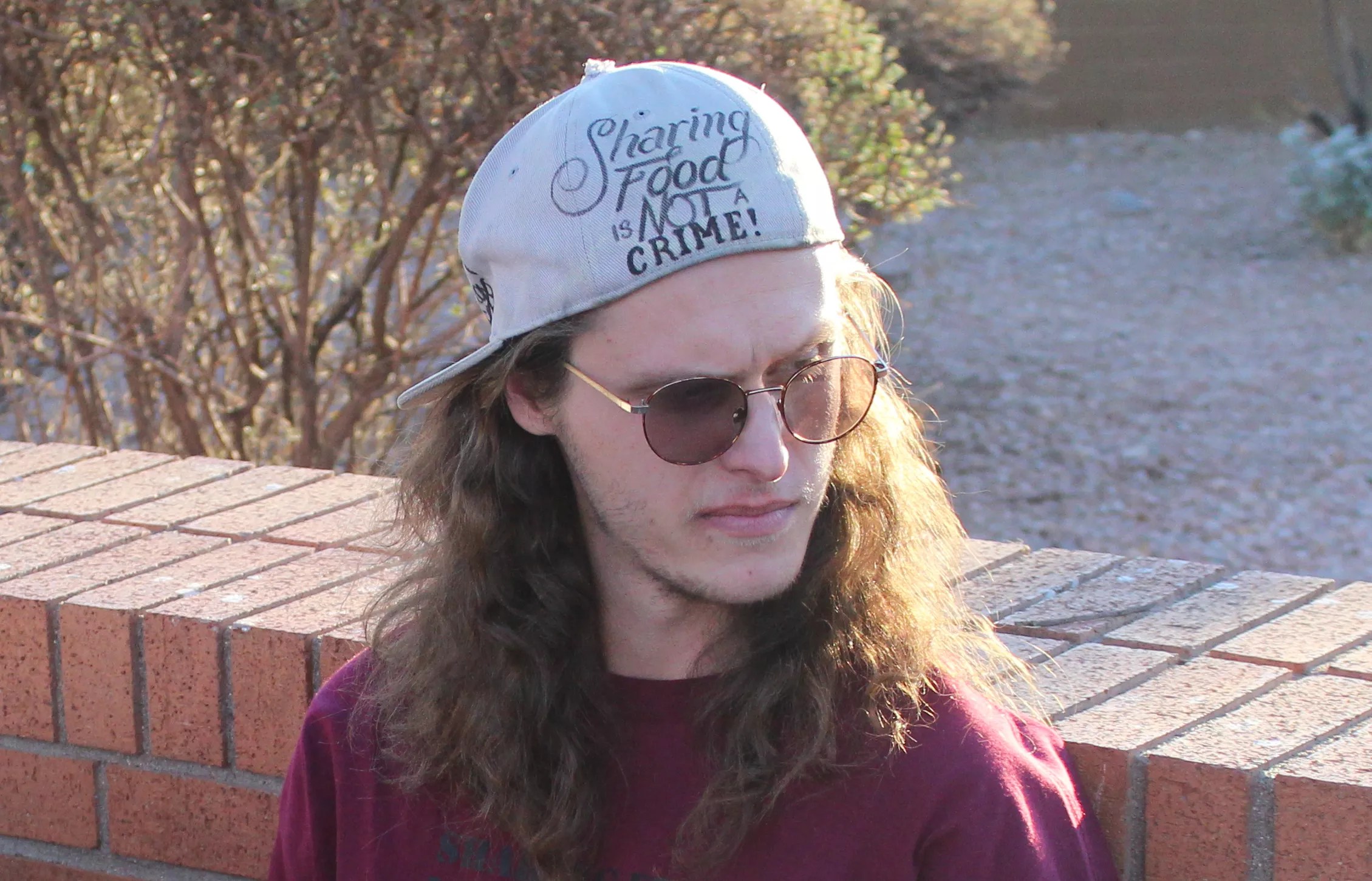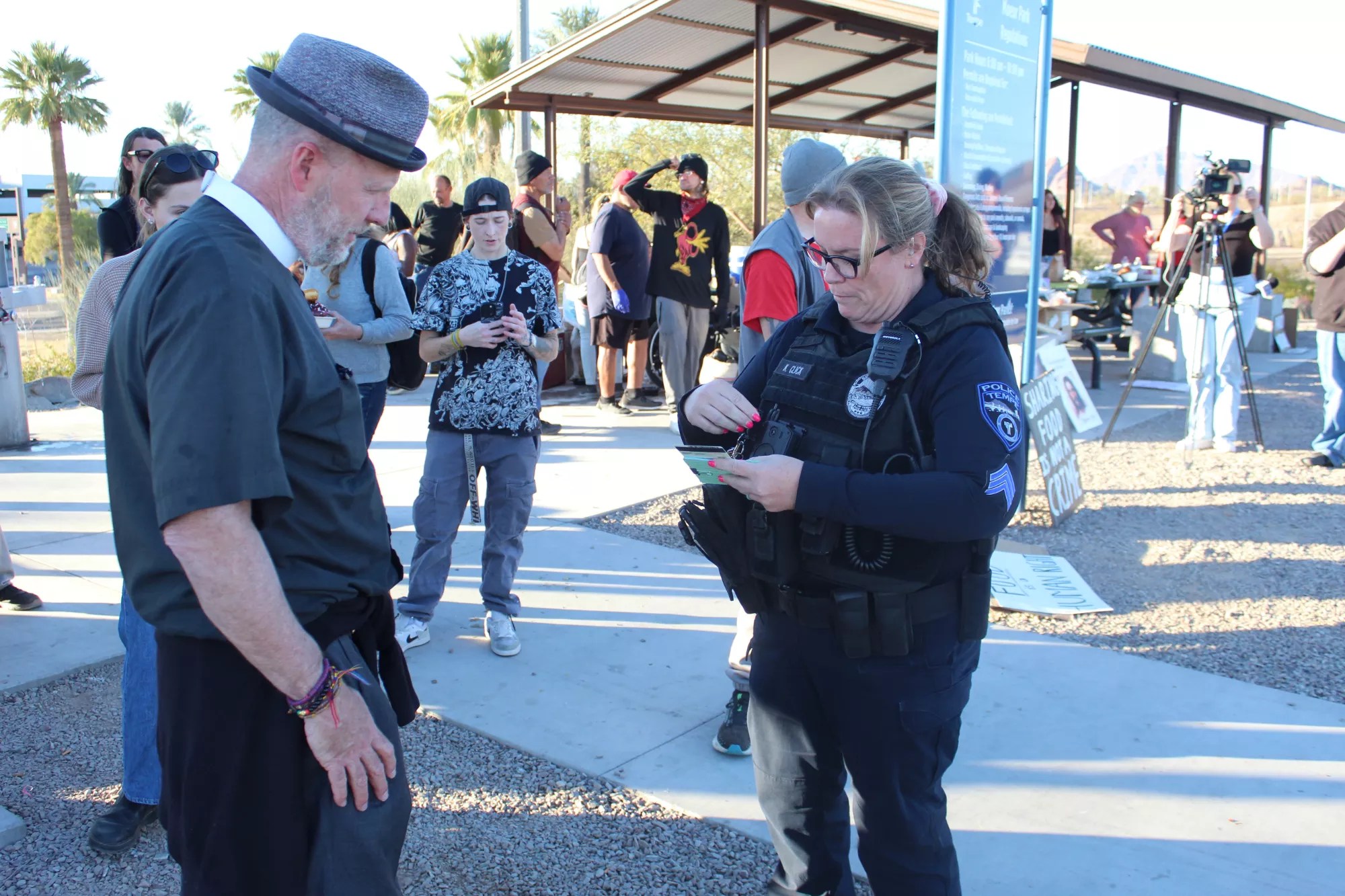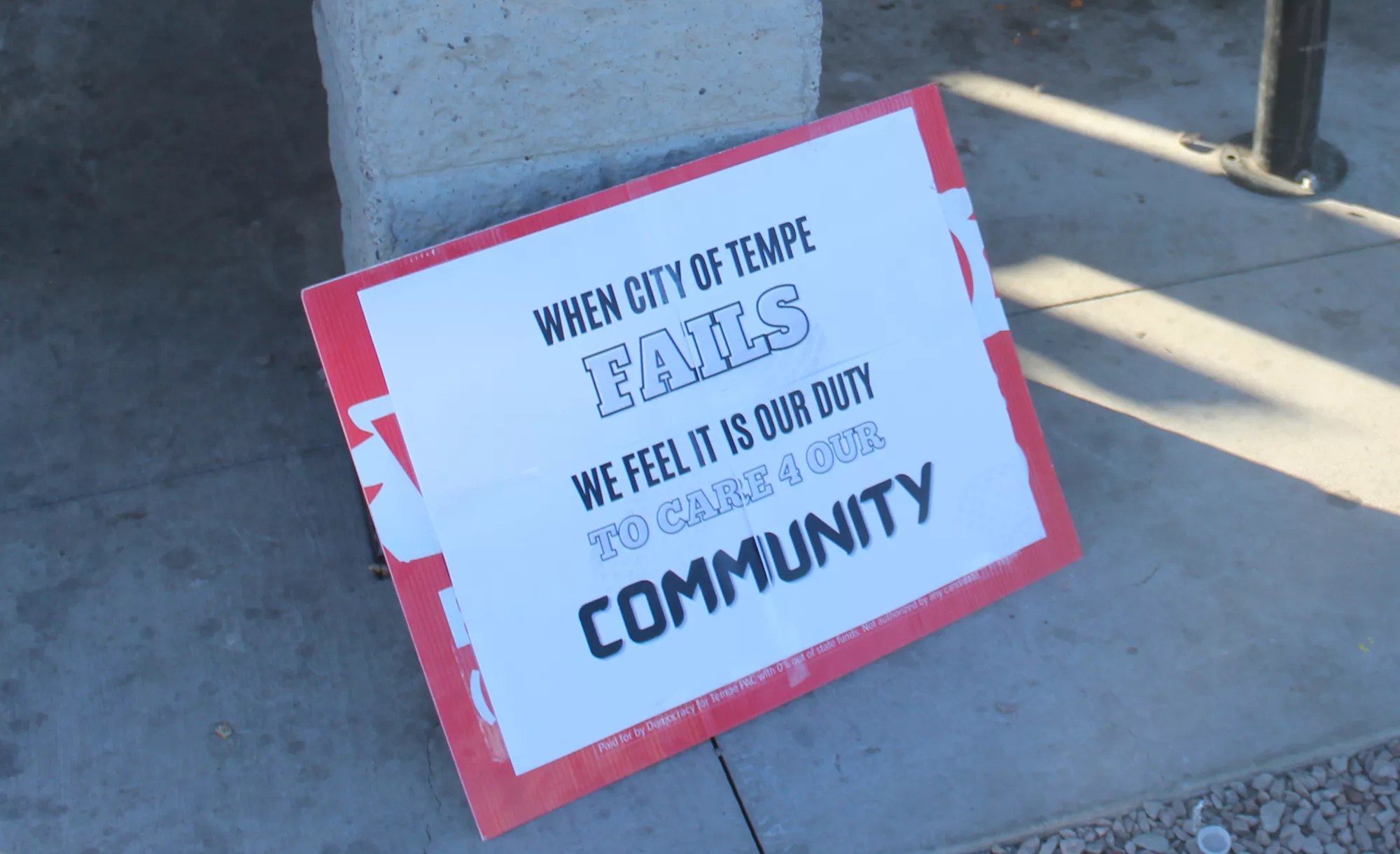
TJ L’Heureux

Audio By Carbonatix
Nearly a year after Tempe first hauled him into court for feeding unhoused people in a city park, homeless advocate Austin Davis is going back – this time of his own volition.
On Thursday, Davis and two other Tempe residents filed a federal lawsuit against the city, claiming Tempe violated their civil rights by criminalizing their efforts to feed unhoused people in public parks every Sunday. Also joining the suit are Ron Tapscott and Jane Parker of the organizations New Deal Meal and H.O.P.E. Arizona, respectively.
The three say Tempe violated the First and Fourteenth Amendments – that is, freedom of speech and equal protection under the law – by requiring a special events permit to feed people in city parks and by citing organizers for hosting meals without a permit. Tempe City Manager Rosa Inchausti is named as a defendant in the suit.
“Tempe markets itself as a progressive city,” Tapscott said in an interview. “We know they are anything but that.” Davis added that Tempe has “wasted an incredible amount of time and money on this super unsuccessful campaign to criminalize homelessness.”
Parker could not be reached for comment.
In a statement emailed to New Times, Tempe spokesperson Kris Baxter-Ging said the city has not yet been served with the suit, though its officials “disagree with the allegations and we stand ready to defend this longstanding law.”
“When an event is held utilizing City property that is open to the public, Tempe City Code requires a special event or other permit,” Baxter-Ging’s statement added. “This requirement – which applies equally to everyone – has been a requirement of the Tempe City Code for decades.”
But critics and longtime residents of the city, including Parker, have previously told Phoenix New Times that people feeding the homeless for decades have not been cited under the law. The lawsuit argues the special events law doesn’t apply to simply giving food to others.

Rev. Dr. Tom Martinez is issued a warning by a Tempe police officer at a homeless feeding event in a Tempe park on Feb. 2.
TJ L’Heureux
On the offensive
The lawsuit marks a new front in a battle that has lasted more than a year, though it more recently seemed to have reached a detente. Davis was the first to fall out of favor with the city, which cited him with 34 counts of violating Tempe’s special events ordinance. That resulted in a court battle and plea deal that banned him from city parks into 2026. Davis was arrested and jailed in between for trespassing in the parks.
With Davis and hits organization AZ Hugs unable to continue feeding people, community members like Tapscott and state Sen. Lauren Kuby stepped in to help. As he watches people share food, Davis sits outside the nearby Marquee Theatre, monitoring from a bench that he has wryly dubbed his “office,” where he works to help the homeless find housing and employment, access mental health resources and join detox programs.
“I’m just so thankful for the neighbors of Tempe,” Davis said. “This wouldn’t be possible without the people of Tempe standing up for what they believe in. That hypes me up.”
Most recently, Tapscott and others attempted to circumvent the city’s special events ordinance by starting New Deal Meal, which operates like a club that community members and unhoused people must join in order to participate in the meals, which were now billed as private events.
Yet the city still continued to cite the group for hosting the meals without a permit, hitting Tapscott with a citation on Jan. 26. A week later, he said, Tempe police officers delivered a warning to Rev. Dr. Tom Martinez, the senior minister at Desert Palm Church of Christ, said they would cite Martinez if he hosted again.
Tempe hasn’t followed through on that threat, mostly watching the meals from unmarked police vehicles, Tapscott said. Clearly, though, Tempe’s advocates for the unhoused are less than satisfied with the uneasy status quo. If fact, the support they’ve received in their staredown with the city has emboldened them.
“If anything, this whole experience has shown that we can best take care of our community when we involve as many people from the community as possible,” Davis said, adding that the lawsuit gave him “hope that government officials can be put in check and don’t have unlimited power to do whatever they want.”

Tempe prosecuted Austin Davis for violating its special permit ordinace for feeding people in need, though the city and Davis later reached a plea deal.
TJ L’Heureux
What the lawsuit says
Davis, Parker and Tapscott are represented by Russell Facente, who previously represented Davis in his criminal proceeding, and by the Pacific Legal Foundation, a public interest law firm whose website says it “defends Americans from government overreach and abuse.”
The lawsuit seeks declarations from the court that the city’s special events ordinance does not apply to the meals and that its enforcement violates their freedom of speech. It also requests that a judge issue a permanent injunction preventing the city from applying the special events ordinance to their events.
“For many, charity is not only an expression of one’s desire to help, but also an expression of protest against government policy,” the lawsuit reads. “But in the City of Tempe, the charitable act of sharing food with the hungry without an onerous ‘special events’ permit is a crime.”
To undergird the free speech claim, the suit argues that, “as courts have widely recognized, sharing food can be expressive conduct protected by the First Amendment.” By sharing food, Tapscott, Davis, Parker and others “engage in protest” against Tempe’s homelessness policies.
“When the government is failing to take care of people, it’s our responsibility to work together to meet that need and protest against the government’s failure,” Davis told New Times. “It should not be a crime, and it isn’t a crime, to share food.”
The suit also says the city’s permit requirement discourages organizers from hosting the meals “to move homelessness out of public view.” It adds: “A desire to remove a disfavored group from a certain area is not a legitimate government interest, let alone a compelling one.” It also argues that Tempe’s ordinance doesn’t apply to charitable meals – or, if it does, that the application is overly broad.
“The ordinance’s catchall for any ‘outdoor public gathering’ cannot be so broad as to encompass food-sharing, because such an interpretation would also create constitutional implications, since it would sweep in (a) vast amount of protected First Amendment activity, including protests, debates, prayer circles, book clubs, or other small gatherings, and create equal protection concerns,” the lawsuit reads.
Interestingly, Tempe’s website includes a pamphlet for the special events permit process that encourages residents “to be Healthy Givers” by “working hand-in-hand with nonprofits that provide the most effective, lasting help.” AZ Hugs and H.O.P.E Arizona, the two organizations run by Davis and Parker, are not included among the nonprofits listed in the brochure.
“The government does not have a monopoly on charity,” Pacific Legal Foundation said in a press release about the lawsuit. “Americans have the constitutional right to pursue their callings, including helping those in need, without burdensome regulations.”

A sign sits under a pavilion during a Feb. 2 meal for unhoused people in a Tempe park.
TJ L’Heureux
Financial burden
Though the meals have continued for now, Parker has previously said that the city’s zealous enforcement of its special permit ordinance has already affected her ability to help people.
A 77-year-old woman who has lived in Tempe for 34 years, Parker co-founded H.O.P.E. Arizona in 2020 after she “saw people suffering in her community,” the lawsuit says. The organization fed unhoused people for years without a problem until 2022, when the city started to require permits. Parker told the Tempe City Council that her organization cannot afford the permits, which she said costs $5,000 a year.
“We don’t have that kind of money,” an emotional Parker said during an August 2024 meeting. “I wish the mayor and the city council would be more compassionate to the homeless.”
AZ Hugs, Davis’ organization, was to pay for permits and insurance. However, the city denied his application, citing the fact that Davis did not stop hosting his Sunday meals while his application was being processed. When Davis continued the meals after that denial, the city hit him with dozens of violations of the ordinance.
Anastasia Boden, a senior attorney at Pacific Legal Foundation, said Davis shouldn’t have had to seek a permit in the first place.
“AZ HUGS should be free to offer food to those who are hungry without facing a costly barrier or threat of criminal prosecution,” she said.
With an estimated 10,000 homeless people in Maricopa County, cities like Tempe and service providers struggle to meet the needs of the unhoused. Yet Tapscott and others feel Tempe’s approach has been to scowl at and fight the people trying to make a difference. He worries that, with Donald Trump now in the White House, that’s a sign of a larger shift that will make it harder to get people the help they need.
“The city’s operation is very much in congruence with the way the Trump administration wants to treat people,” he said. “They may very well start turning their sight on people on the streets.”